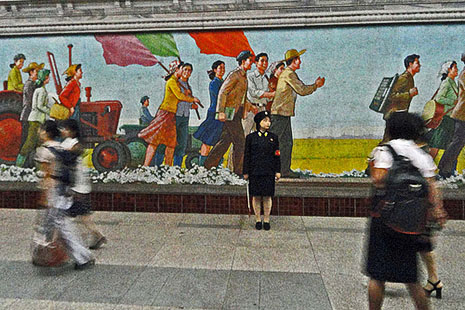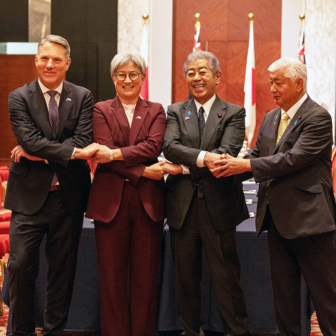NORTH KOREA presents major challenges to the region and to the world, not least because of the problems created by its often-arbitrary behaviour. In recent weeks, Pyongyang has allowed family reunions with South Korean families split by the 1950–53 war, and has hinted that it might cooperate with Japan to resolve the dispute over Japanese citizens who were secretly abducted and taken to North Korea in the 1970s and early 1980s. At the same time, though, it responded strongly to recent South Korean and American joint military manoeuvres and used extremely uncivil language when South Korea’s president, Park Geun-hye, argued in late March that the North’s nuclear program should come to an end.
As Andrei Lankov, among the most respected observers of the country, wrote last year, no other country could attract such high-level attention across the world, or plot its way into the agendas of global meetings, in quite the way that North Korea does. The new leader, Kim Jong-un, has undoubtedly inherited his father’s ability to confuse and bewilder.
Chinese leaders have traditionally stressed that they are Pyongyang’s true ally and will do what it takes to ensure that North Korea is stable and free of US influence. Strategically, the last thing that China wants is a unified peninsula under American hegemony – a point that is often forgotten but extremely important. China fought alongside the North Korean armies of Kim Il-sung in the 1950–53 war, sending more than two million soldiers and suffering colossal losses, among them Mao Zedong’s own son. Even today Chinese leaders feel strongly about that conflict.
It was in the period of greatest instability, the 2000s, that North Korea made clear its intention to build a nuclear capacity. Even then, senior leaders in Beijing, while voicing frustration, didn’t forsake their small neighbouring ally. Wu Bangguo, chairman of the Standing Committee of the National People’s Congress, and president Hu Jintao were among the senior Chinese leaders who stressed that the two countries were in a relationship “like lips and teeth.” China became North Korea’s largest supplier of aid, its largest trade partner, and its largest supplier of energy. It also became Pyongyang’s sole diplomatic supporter after the six-party talks – started under the Bush administration and involving Russia, South Korea, China, North Korea, Japan and the United States – came to an end.
Since the death of Kim Jong-il in late 2011, North Korea has sent increasingly confusing signals. On the one hand, it has embraced modest market reforms under Kim Jong-un relatively youthful leadership; on the other hand, it has continued its nuclear program despite China’s concerns, and has adopted a truculent attitude to the outside world. The execution of one of Kim’s chief advisers in late 2013, wholly unexpected in the outside world, only underlined just how hard it is to predict North Korea’s actions.
We can see now that the ruling elite – perhaps 100,000 relatively well-off stakeholders in the current system – is caught in a trap. Reform is desperately needed to give new energy to an economy devastated by years of isolation and poor management. From equal footing in the 1970s, North Korea now has an economy only 2 per cent of the size of South Korea. This is profoundly humiliating. Yet economic reforms are almost certain to cause huge political turmoil, and may well see the end of the political system as it exists, so the incentives for the current rulers to introduce deep reforms are therefore very low. The current strategy seems simply to survive, even though North Korea’s leaders do this by highly contentious and unorthodox methods. It is for good reasons that one historian has called North Korea a guerilla state. It lives in constant peril and has adopted extreme methods to carry on – sometimes trading in illegal substances to raise revenue, and often blackmailing the rest of the world to give it the support and material benefits it needs.
Despite the friendly language, many Chinese policy-makers feel frustrated by their small neighbor. They feel that North Korea should introduce the same controlled reforms that China did in the 1980s, when it embarked on its program of economic liberalisation and opening up. They have shown leaders like Kim Jong-il the science parks in Shanghai and Shenzhen and tried to give them some idea of how a socialist system can enjoy the benefits of capitalism. There were signs in the early 2000s that markets were being accepted in North Korea, but these may simply have shown that there is no way of stopping people in an era of incredible hardship from trying to make some money illicitly. But North Korea’s legal system has never embraced market activity, and the major free-trade zone, set up over a decade ago, hosts only a few foreign enterprises.
Kim Jong-un has yet to visit Beijing, and it is unclear who his advisers are. He was educated in Switzerland, which might give him a more open attitude to economics, but he has made no bold reform moves. Recent visitors report that there are more cars on the streets of Pyongyang, more mobile phones and more internet coverage, and that small markets do still exist. The underlying narrative that legitimises the regime, however, is still exhaustively promoted. North Korea’s problems, the story goes, are all caused by the outside world, particularly the United States and Japan, and it is a victim of others’ aggression. The regime looks at what has happened in the outside world, particularly in the Middle East, and concludes it must have a strong military capacity to survive. This is why nuclear weapons of some sort are a huge part of its strategy: when it sees the former Libyan leader Colonel Gaddafi murdered in broad daylight and his government toppled, it sees this as a consequence of his renouncing of nuclear weapons. For the North Korean ruling elite, this weaponry is the ultimate security guarantee.
This is the hardest part of their thinking for China to accept. In India, Pakistan and Russia, China already has three nuclear powers on its borders. It must now face a fourth, and one that is also extremely unstable and unpredictable. It has far less leverage over North Korea than many think, because it is dealing with ultra-nationalists who have made their state similar to a religion and regard all outsiders, including the Chinese, as potential enemies. Despite sharing Communist Party–based systems and a concentration of power in politburos, the Chinese system has evolved completely differently from North Korea’s. There, all power flows from the Kim family, and from its leading figure, Kim Jong-un. China has no equivalent emperor-like figure.
China knows what it doesn’t want – a unified peninsula on US terms – but is not so clear about what it does want. For the moment, a weak North Korea is probably acceptable. One that would topple and fail would cause problems of instability and threat, and China doesn’t want millions of starving, desperate migrants coming across its northeastern borders. Nor does it want a North Korea that provokes Japan, South Korea and other countries into conflict. So most of Beijing’s diplomatic effort in Pyongyang is spent on tactical issues – on giving the country just enough support as an ally that it doesn’t tie its own hands. China probably finds North Korea as frustrating as the rest of the world does, but it has less opportunity to distance itself because of its geographical and political proximity. It must often feel used by North Korea, and this might be behind the relative cooling of relations in the last year or so.
North Korea might be able to survive in its current form for many years. But no one pretends that it is economically and politically sustainable in the longer term. It is, as one British analyst observed, a regime creaking at the seams. So the main policy consideration for China is how to influence North Korean behaviour so that a reform process might be as smooth as possible. This is a huge task. At the moment, it seems, no one has any easy answers. •




